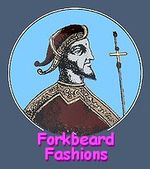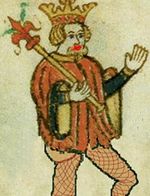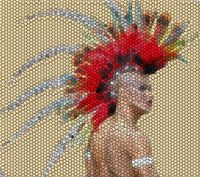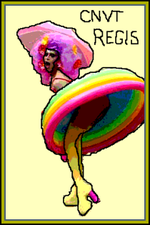Æthelred the Unready
Æthelred II (c. 968 – 23 April 1016), was King of England (978–1013 and 1014–1016). Ascending to the throne of England in 978, Æthelred was perhaps the most doom-haunted of all English kings and certainly the least fashionable. His reign coincided with the height of the Viking rape of the English fashion industry—time and again the Nordic raiders swept dwon from the north with their daring slit skirts, high-heeled vinyl booties, and shiny day-glo fabrics. Under their onslaught the brave candle of English culture flickered, trembled, and seemed about to snuff it.
Desperate Englishmen, defeated at fashion shows, attempted to bribe the Danish king Sweyn Forkbeard by paying him tribute: the Poovesgeld. Craven bribery was their only hope of survival.
Æthelred struggled all his short life to defeat the Viking hordes and abolish the Poovesgeld, but failure attended him like a veritable Jeeves. Historians attribute Æthelred's defeats to his terrible fashion sense: always surprised by the Danes, he would appear in battle wearing mauve pantaloons with ever-so-icky chartreuse stockings and a plaid blouse, all of it thrown on higgledy-piggledy in his hurry.
Even his supporters called him Æthelred the Unready.
Pooves or Poofters?[edit | edit source]
In the millennial year of 1000 a terrible schism threatened the government of England. The powerful Archbishop Aelfhea of Canterbury said the knights of Æthelred were pooves, but William Slippery, Duke of Essex and a fashionista of the noblest sensibilities, insisted that Æthelred's men were poofters.
The Archbishop and his supporters quoted the Bible to justify their position:
- So an host of pooves did go onto the field, as commanded by Moses, and wavéd they their bottoms at the Assyrian horde. Then did the Assyrians go all coy and giggly, and retired from the field of Hebron without fighting. And the pooves pranced victorious before the Lord. Exodus 12:3.5A
But the Duke of Essex retorted that the Bible referred to a bunch of Hebrews and not English knights, and the English were obviously poofters and not pooves.

The two men petitioned King Æthelred for resolution of the argument.
Æthelred pondered the question. The distinction between pooves and poofters tolled a bell in his English soul. He saw the future stretching like the lingerie racks of an Agent Provocateur shop before him. Across the centuries he glimpsed what England might someday become—not a nation of shopkeepers but a country of gaiety: of beautiful butch men and sultry silken women.
Or vice versa.
Of course he had quit taking his medication, and that always makes reality problematic.
At any rate, it took Æthelred a long time to come to a decision...too long, in fact. For whilst the King paced his chambers and the English court stood idle, Sweyn Forkbeard sailed his Viking warships to the shores of England with a simply fabulous line of summer frocks and daring flame-orange cocktail dresses. He swept south in triumph, failing only in capturing London itself.
This was the Danish fashion coup of 1009, and it sent England reeling.
For the next four years Æthelred was a de facto vassal of Sweyn Forkbeard. He never appeared in public wearing anything but the Forkbeard fashion line, and often delivered his weekly BBC addresses in a rather darling pink taffeta pinafore with matching pigskin pumps, an ensemble personally designed by Sweyn.
The Forkbeards Take The Throne[edit | edit source]
The Danish humiliation of England culminated in 1013 with the crowning of Sweyn Forkbeard as the Fashion King of England. He received the fealty of the English feudal lords dressed in a deep purple silk bodystocking, a frilly lilac tutu, and scarlet vinyl thighboots. His pustulent son, Cnut Forkbeard, wore a shocking pink off-the-shoulder chemise, scarlet stockings, and high-heeled Doc Marten boots.
Æthelred for some reason chose this moment to assert his masculinity and wore a fusty tweed suitjacket with 4-foot-wide padded shoulders and an awful plaid skirt. Dressed like a Scottish pigkeeper he could do little but smolder quietly on the sidelines as the flamboyant Danes pranced down the runway.
The English, who had struggled through the Dark Ages to keep their Scanty-Panties™ unstained by foreign domination, now had to accept a Danish overlord who wore more makeup than an entire Amsterdam bordello.
It was a bitter pill to swallow.
Exile and Death[edit | edit source]
In 1002 Æthelred had married Emma, daughter of Richard I of Normandy and his queen, Elton John. When the odious Forkbeards seized power in 1013 Æthelred and Emma fled to Normandy aboard the RMS Lusitania. There they invoked the hospitality of Emma's family and lived as guests of the Norman royal household.
The French princess Emma Mickleknickers bore Æthelred two sons: Alfred the Pickled and Edward the Confessor. Alfred and Edward grew up surrounded by the picaresque pomp and pagentry of medieval France. They hunted foxes and rode motocross; dined on creamed bream, whole roast paysan, and pears-in-a-sheep's-stomach; and had the run of Travelodges from Cape Breton to Marseille. All in all it wasn't a bad life if you ignored the filthy disease-ridden peasants dropping dead all around you.
But even the pampered royals entertained risks. Sport was often their undoing, and so it was with the erstwhile English king.
Æthelred, most useless of English kings, was out riding his Moto Guzzi when he slipped from his galloping steed and his corset laces caught on the mudguard. His corset pulled so tight that his kidneys shot out his nose. He died the next day, April 13, 1016.
The news did not reach England for six months, and it was only in 1052 that the English honored Æthelred with a Pez dispenser bearing his likeness.
Legacy[edit | edit source]
Æthelred's son Edward regained the English throne briefly after Sven Forkbeard swallowed an ox and exploded, but lost it to Sven's son Cnut when Cnut married Edward's mother, Emma Mickleknickers. However, Cnut was secretly in love with Elton John. The desperation of this forbidden love drove Cnut to wild fashion excesses: pink ostrich plume hats, dyed python-skin bustiers, and black leather underpants.
Edward watched Cnut's growing madness and bided his time, and in 1042 he once again seized the throne. This time he held onto power despite the machinations the romantic duo Magnus, King of Norway, and Harold the Earl of Wessex. Edward the Confessor finally put an end to the Poovesgeld, freed the English from Danish fashion overlords, and made the dreams of his father Æthelred reality.
Of course it all came crashing down in 1066 when an army of French pouffes under William the Conqueror flooded English clothes-shops with Chantilly lace panties...but that's another article.



